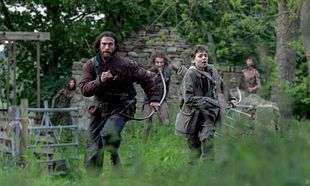As young Conor (Lewis MacDougall) struggles to make sense of the worsening illness of his mother (Felicity Jones), he is visited at night by a giant anthropomorphic tree (Liam Neeson) who tells him a fantastical story that draws parallel with his own situation.
There's always been an element of darkness to children's fairytales and it's only recently that filmmakers have begun to work this cornerstone into the overall architecture of their work. From Burton's Edward Scissorhands right through to Del Toro's Pan's Labyrinth, it's become more acceptable to bring deeper and more morose tones into what would have been essentially films primarily aimed at teenagers and the like. A Monster Calls is of the same school as Pan's Labyrinth, but with its own flourishes and nuances that make for an intriguing take on a not wholly original story.
Conor is a troubled young boy in England whose mother, Lizzie, has been diagnosed with a terminal illness. An artistic and creative mother who is raising Conor alone, he's also dealing with a particularly sadistic bully at school, a loving but estranged father and the reality that he is powerless to stop what is to come. It's heavy stuff from the very get-go and Bayona's direction doesn't allow us to look away at any point. Before long, Conor is sent to live with his mother, played by Sigourney Weaver with a deeply distracting English accent. As he struggles to adjust to the changes in his life, his imagination brings forth a giant tree voiced by Liam Neeson who tells him a nightly tale of fantasy that impacts his very real world.
For a film like this to work, it has to rely both on strong performances and convincing CGI to work. Thankfully, A Monster Calls has both in spades. Lewis MacDougall gives a harrowing portrayal of a truly damaged child who has been beset by a cruel fate that is out of his control. What's more distressing to watch is just how much he desperately clings to hope when all signs point away from it. It's not an easy thing to make believable, but MacDougall brings an earnestness to it that is deeply touching. Likewise, Jones brings a warmth to the cold world the story inhabits. Sigourney Weaver, sadly, is the weak link as her performances veers into overly theatrical flourishes in a film that really, really doesn't need it. The titular monster, voiced by Liam Neeson, is the real star. With tasteful design and a deep, bellowing voice, Neeson takes what could have been a lifeless blob of sprites and turns into one of the most arresting CGI performances since Andy Serkis in Dawn Of The Planet Of The Apes.
Bayona skillfully uses the elements he has to work with - Neeson's gravitas, MacDougall's vulnerability, Jones' innate decency - to create a deeply affecting story of coping with loss at a young age and the toxicity of anger and frustration. Together with the cinematography of Oscar Faura and Fernando Velazquez's symphonic swells, Bayona seamlessly blends reality with the fantastical. When the story brings in Neeson's monster, it feels earned and understood and the consequences of these visits play out in unique ways. While it might veer ever so slightly into melodrama at certain points, you get the sense that it is earned in that moment. It's an awful thing to see someone's life ebb away and be powerless to do anything about it, despite your best hopes - and the film understand the truth of this in the interplay between Jones and MacDougall.
Deeply affecting in parts, with some stunning visuals, A Monster Calls works extremely well as an emotive fantasy drama with some impressive performances.



















































































